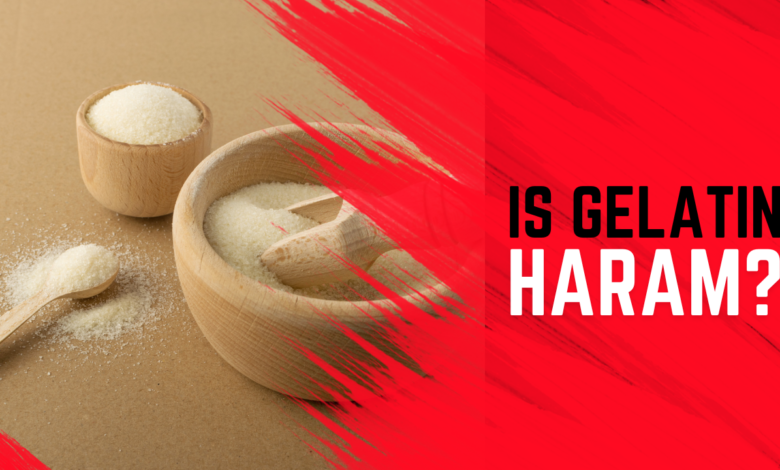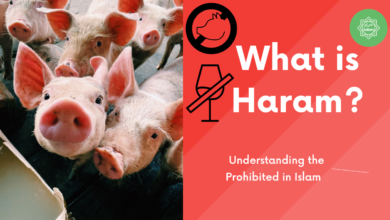
Is Gelatin Haram?
Gelatin can be considered Haram or Halal, depending on its source and how it’s processed. It is essential to determine the origin of the gelatin before concluding whether it is Halal or Haram.
Introduction
Gelatin is a common ingredient found in many food products, medications, and even cosmetics. However, its origins and composition have raised questions among those who follow Islamic dietary guidelines. Gelatin is derived from animal sources, which has led to a debate within the Muslim community about whether it is halal (permissible) or haram (forbidden) to consume. In this article, we will explore the contentious issue of gelatin’s halal status and provide a balanced perspective on the topic.
What is Gelatin?
Gelatin is a protein substance obtained from collagen, which is present in the connective tissues, bones, and skin of animals, typically cows and pigs. The process of creating gelatin involves boiling these animal tissues to extract the collagen, which is then purified and processed into a substance that can be used in a wide range of products.
Gelatin in Food
Gelatin is commonly used in various food products, including desserts like gummy candies, marshmallows, and gelatin-based desserts. It is also found in some processed foods to improve texture and stability. Since it is derived from animal sources, the use of gelatin in food has raised concerns about its halal status.
Islamic Perspective on Gelatin
The question of whether gelatin is halal or haram is a matter of interpretation and debate among scholars of Islamic jurisprudence. The primary concerns related to gelatin’s halal status are:
- The Source of Gelatin: Gelatin can be sourced from both halal and haram animals, including cows and pigs. If the gelatin is derived from a halal animal slaughtered according to Islamic dietary laws, some scholars argue that it can be considered halal. However, when the source is uncertain or haram, it may pose an issue.
- Transformative Process: Some scholars argue that the extensive processing gelatin undergoes, including boiling and purification, may render it halal as it undergoes significant chemical changes during this process. Others may maintain that the original source’s impurity remains, making it haram.
- Traces of the Original Source: There is also concern about the possibility of traces of the original animal source remaining in the gelatin, even after processing. This factor can influence the halal status of the final product.
Also Check
- Is it Haram to Have a Dog?
- Is Trading Haram in Islam?
- What Is Dussehra?
- What Is Shirk Islam?
- What is Haram in Islam?
Halal Certification
To address the uncertainty surrounding the halal status of gelatin, many Muslim-majority countries and organizations have established halal certification authorities. These authorities work to ensure that products containing gelatin, and other ingredients of questionable origin, meet Islamic dietary requirements. Products that pass the certification process are labeled as “halal” and can be safely consumed by Muslims.
Vegetarian and Halal Gelatin Alternatives
To cater to the dietary preferences of Muslim consumers, various alternatives to animal-derived gelatin have been developed. Some companies produce gelatin substitutes made from plant-based sources, such as agar-agar, carrageenan, and pectin. These alternatives are considered halal and are widely used in various food products.
Conclusion
The halal status of gelatin remains a topic of debate within the Muslim community, primarily due to concerns about its source, transformative process, and potential traces of the original animal. In response to these concerns, halal certification authorities have been established to ensure that gelatin-containing products adhere to Islamic dietary requirements.
Ultimately, whether gelatin is considered halal or haram may depend on the interpretation of Islamic jurisprudence by different scholars and the practices of individual Muslims. It is essential for Muslims to be informed about the source of the gelatin in the products they consume and to look for halal certification when in doubt. Additionally, the availability of vegetarian and halal alternatives to gelatin offers consumers more options in adhering to their dietary preferences.
(FAQs) about whether gelatin is considered Haram (forbidden) in Islamic dietary guidelines:
Is gelatin Haram in Islam?
Gelatin can be considered Haram or Halal, depending on its source and how it’s processed. It is essential to determine the origin of the gelatin before concluding whether it is Halal or Haram.
What is gelatin, and where does it come from?
Gelatin is a protein obtained from collagen, a connective tissue found in animals. It is often sourced from the bones, skin, and other animal by-products.
Is all gelatin Haram?
Not all gelatin is necessarily Haram. It depends on whether the source of the gelatin is Halal or Haram.
What makes gelatin Haram?
Gelatin becomes Haram if it is derived from animals that are not slaughtered in accordance with Islamic dietary laws (Zabiha or Halal meat).
Is gelatin made from pork Haram?
Gelatin derived from pork is generally considered Haram in Islam due to the prohibition of pork consumption.
Can gelatin from non-pork sources be considered Halal?
Gelatin sourced from animals slaughtered according to Islamic guidelines can be considered Halal. This includes animals like cows, sheep, and chickens if they are slaughtered in the appropriate manner.
How can I tell if a product contains Halal or Haram gelatin?
To determine the status of gelatin in a product, look for Halal certification labels or contact the manufacturer for information about the source and processing of the gelatin used.
Are there any alternatives to gelatin for Muslims who want to avoid it?
Yes, there are alternatives to gelatin, such as agar-agar, carrageenan, and pectin, which are plant-based and generally considered Halal.
Is it permissible to consume products with non-Halal gelatin if there are no alternatives available?
In cases of necessity, when no Halal alternatives are available, it may be acceptable for Muslims to consume products containing non-Halal gelatin, as long as they do so with the intention of necessity and avoid it when possible.
Can gelatin status vary by region or cultural interpretation?
Yes, the interpretation of Halal and Haram can vary by region and cultural practices within the Islamic world. What is considered acceptable in one place may differ from another.



